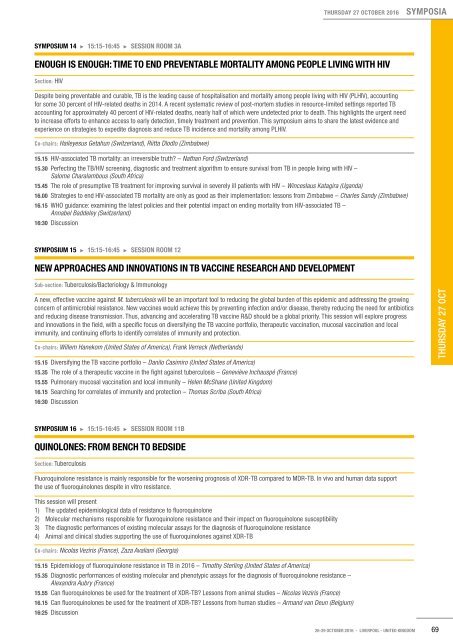TO INNOVATIONS
2f3gIP7
2f3gIP7
You also want an ePaper? Increase the reach of your titles
YUMPU automatically turns print PDFs into web optimized ePapers that Google loves.
THURSDAY 27 OC<strong>TO</strong>BER 2016 SYMPOSIA<br />
SYMPOSIUM 14 3 15:15-16:45 3 SESSION ROOM 3A<br />
ENOUGH IS ENOUGH: TIME <strong>TO</strong> END PREVENTABLE MORTALITY AMONG PEOPLE LIVING WITH HIV<br />
Section: HIV<br />
Despite being preventable and curable, TB is the leading cause of hospitalisation and mortality among people living with HIV (PLHIV), accounting<br />
for some 30 percent of HIV-related deaths in 2014. A recent systematic review of post-mortem studies in resource-limited settings reported TB<br />
accounting for approximately 40 percent of HIV-related deaths, nearly half of which were undetected prior to death. This highlights the urgent need<br />
to increase efforts to enhance access to early detection, timely treatment and prevention. This symposium aims to share the latest evidence and<br />
experience on strategies to expedite diagnosis and reduce TB incidence and mortality among PLHIV.<br />
Co-chairs: Haileyesus Getahun (Switzerland), Riitta Dlodlo (Zimbabwe)<br />
15.15 HIV-associated TB mortality: an irreversible truth? – Nathan Ford (Switzerland)<br />
15.30 Perfecting the TB/HIV screening, diagnostic and treatment algorithm to ensure survival from TB in people living with HIV –<br />
Salome Charalambous (South Africa)<br />
15.45 The role of presumptive TB treatment for improving survival in severely ill patients with HIV – Winceslaus Katagira (Uganda)<br />
16.00 Strategies to end HIV-associated TB mortality are only as good as their implementation: lessons from Zimbabwe – Charles Sandy (Zimbabwe)<br />
16.15 WHO guidance: examining the latest policies and their potential impact on ending mortality from HIV-associated TB –<br />
Annabel Baddeley (Switzerland)<br />
16:30 Discussion<br />
SYMPOSIUM 15 3 15:15-16:45 3 SESSION ROOM 12<br />
NEW APPROACHES AND <strong>INNOVATIONS</strong> IN TB VACCINE RESEARCH AND DEVELOPMENT<br />
Sub-section: Tuberculosis/Bacteriology & Immunology<br />
A new, effective vaccine against M. tuberculosis will be an important tool to reducing the global burden of this epidemic and addressing the growing<br />
concern of antimicrobial resistance. New vaccines would achieve this by preventing infection and/or disease, thereby reducing the need for antibiotics<br />
and reducing disease transmission. Thus, advancing and accelerating TB vaccine R&D should be a global priority. This session will explore progress<br />
and innovations in the field, with a specific focus on diversifying the TB vaccine portfolio, therapeutic vaccination, mucosal vaccination and local<br />
immunity, and continuing efforts to identify correlates of immunity and protection.<br />
Co-chairs: Willem Hanekom (United States of America), Frank Verreck (Netherlands)<br />
15.15 Diversifying the TB vaccine portfolio – Danilo Casimiro (United States of America)<br />
15.35 The role of a therapeutic vaccine in the fight against tuberculosis – Geneviève Inchauspé (France)<br />
15.55 Pulmonary mucosal vaccination and local immunity – Helen McShane (United Kingdom)<br />
16.15 Searching for correlates of immunity and protection – Thomas Scriba (South Africa)<br />
16:30 Discussion<br />
THURSDAY 27 OCT<br />
SYMPOSIUM 16 3 15:15-16:45 3 SESSION ROOM 11B<br />
QUINOLONES: FROM BENCH <strong>TO</strong> BEDSIDE<br />
Section: Tuberculosis<br />
Fluoroquinolone resistance is mainly responsible for the worsening prognosis of XDR-TB compared to MDR-TB. In vivo and human data support<br />
the use of fluoroquinolones despite in vitro resistance.<br />
This session will present<br />
1) The updated epidemiological data of resistance to fluoroquinolone<br />
2) Molecular mechanisms responsible for fluoroquinolone resistance and their impact on fluoroquinolone susceptibility<br />
3) The diagnostic performances of existing molecular assays for the diagnosis of fluoroquinolone resistance<br />
4) Animal and clinical studies supporting the use of fluoroquinolones against XDR-TB<br />
Co-chairs: Nicolas Veziris (France), Zaza Avaliani (Georgia)<br />
15.15 Epidemiology of fluoroquinolone resistance in TB in 2016 – Timothy Sterling (United States of America)<br />
15.35 Diagnostic performances of existing molecular and phenotypic assays for the diagnosis of fluoroquinolone resistance –<br />
Alexandra Aubry (France)<br />
15.55 Can fluoroquinolones be used for the treatment of XDR-TB? Lessons from animal studies – Nicolas Veziris (France)<br />
16.15 Can fluoroquinolones be used for the treatment of XDR-TB? Lessons from human studies – Armand van Deun (Belgium)<br />
16:25 Discussion<br />
26-29 OC<strong>TO</strong>BER 2016 - LIVERPOOL - UNITED KINGDOM<br />
69


